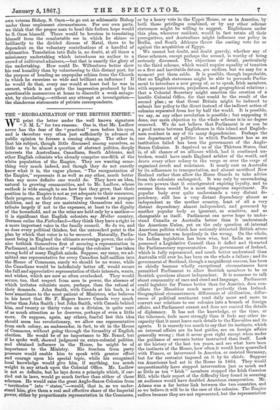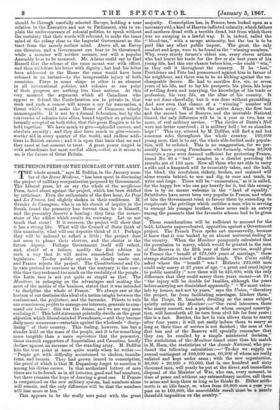THE "REORGANIZATION OF THE BRITISH EMPME."
WE print the letter under the well known signature "J. M. L." for two reasons. One is, that Mr. Ludlow never has the fear of the " practical " men before his eyes, and is therefore very often just sufficiently in advance of public opinion to foresee a coming change. The other is, that his subject, though little discussed among ourselves, so little as to be almost a question of abstract politics, deeply interests the Australians, Canadians, South Africans, and other English colonists who already comprise one-fifth of the white population of the Empire. They are wanting some- thing very much indeed, and though they do not exactly know what it is, the vague phrase, "The reorganization of the Empire," represents it as well as any other, much better than any more definite one would do. They have an idea, natural to growing communities, and to Mr. Ludlow, whose outlook is wide enough to see how fast they grow, that their. position in the Empire is not as yet adequate to their resources, their progress, or their future. They are treated as younger children, and as they are maintaining themselves and con- tribute largely if not to the expenses, at least to the dignity of the household, and as the reins are held only by a mother— it is significant that English colonists say Mother country, German exiles the Fatherland—they think they have a right to a more important voice in the family council. So do we, and so does every political thinker, but the untouched point is the plan by which that voice is to be secured. Naturally, Parlia- ment being in England the ultimate sovereign power, the colo- nies bethink themselves first of securing a representation in Parliament, and the notion of "seating the colonies" has taken strong hold of many English minds. Suppose, say some, we ad- mitted one representative for every Canadian half-million into the House of Commons, surely we should be no worse, while the Canadians would be indefinitely better off, would secure the full and appreciative representation of their interests, wants, and wishes, which are now so often overlooked. They would secure, too, that respect from men in power, the absence of which irritates colonists more, perhaps, than the refusal of their demands. John Smith, with Canada at his back, is a bore sometimes to the most patient of Ministers, who believes in his heart that Sir F. Rogers knows Canada very much better than John Smith ; but John Smith, with Canada behind him, and twenty or thirty votes on- a division, is quite sure of as much attention as he deserves, perhaps of even a little more. Or suppose, again, say others, fearful lest this idea should seem too revolutionary, we allow one representative from each colony, an ambassador, in fact, to sit in the House of Commons, without going through the formality of English election. He would be of no importance to Mr. Brand, but if he spoke well, showed judgment on, extra-colonial politics, and obtained influence in the Muse, he might be of importance to the Ministry. His freedom from party pressure would enable him to speak with greater effect and courage upon his special topic, while his recognized local knowledge would give him, if anything, too much weight in any attack upon the Colonial Office. Mr. Ludlow is not so definite, but he lays down a principle which, if car- ried out in laws, would go much farther than either of these schemes. He would raise the great Anglo-Saxon Colonies from " territories " into "states,"—would, that is, as we under- stand him, give them a real and effective share of the Imperial power, either by proportionate representation in the Commons, or by a heavy vote in the Upper House, or as in America, by both those privileges combined, or by any other scheme statesmen might be willing to suggest. Englishmen under this plan, wherever resident, would in fact retain all their prerogatives, and Australians might influence our policy in Berlin, and South Africans throw the casting vote for or against the acquisition of Egypt.
We cannot but doubt, and doubt gravely, whether any of these schemes, except perhaps the second, is worthy of being seriously discussed. The objections of detail, particularly to the third scheme, which would require equality of taxation as a first and inevitable datum, are endless, but we may for a moment put them aside. It is possible, though improbable, that an English statesman might be able to persuade,Parlia- ment to introduce a new group of, so to speak, Irish meinbers, with separate interests, prejudices, and geographical relations ; that a Colonial Secretary might sanction the creation of a hostile Colonial Office, for that would be the result of the second plan ; or that Great Britain might be induced to submit her policy to the direct instead of the indirect action of colonies separated from her by half the world. It is possible, we say, as any other revolution is possible ; but supposing it done, our main objection to the whole scheme is in no degree removed. We do not believe that Parliament is or can be a good nexus between Englishmen in this island and English- men resident in any of its many dependencies. Perhaps the one department of politics in which Parliament has as an institution failed has been the government of the Anglo- Saxon Colonies. It deprived us of the Thirteen States, that is, of all chance of an alliance which, had it continued un- broken, would have made England arbiter of the world, and drove every other colony to the verge or over the verge of organized revolt and resistance. It nearly cost us Australia by its adherence to transportation, and almost sacrificed New Zealand rather than allow the Horse Guards to take advice from the colonists endangered. It was only by surrendering its own powers that it reinvigorated expiring loyalty, and to resume them would be a most dangerous experiment. No popular body ever quite understands a very distant de- pendency, still less a very distant dependency almost as independent as the mother country, least of all a very distant dependency almost independent, and governed by another popular body as ignorant, as sensitive, and as changeable as itself. Parliament can never hope to under- stand Canadia or Australia better than it understands the American Union, yet on the only question c& internal American politics which has seriously attracted British atten- tion Parliament was hopelessly in the wrong. On the whole, its Indian legislation has been wise, but India no sooner possessed a Legislative Council than it defied and thwarted the Parliamentary representative. Its government of Ireland, which is fully represented, and much better understood than Australia will ever be, has been on the whole a failure ; and its government of Scotland, though a magnificent success, has been so chiefly because wholly exceptional circumstances have permitted Parliament to allow Scottish members to be on Scottish questions almost independent. It is nonsense to talk about community of race and creed and language. Parliament could legislate for France better than for America, does con- ciliate the Mauritius much more perfectly than Ireland. Geographical circumstances, differences of civilization, differ- ences of political sentiment tend daily more and more to convert our relations to our colonies into a branch of foreign affairs, and Parliament cannot and does not control the details of diplomacy. It has not the knowledge, or the time, or the tolerance, feels more strongly than it feels any other in- capacity that it must leave such details to the Executive and its agents. It is scarcely too much to say that its instincts, which on internal affairs are its best guides, are on foreign affairs generally wrong ; that it never goes right except when under the guidance of servants better instructed than itself. Look at the history of the last ten years, and see what have been the instincts of the House, how often it would have quarrelled with France, or intervened in America, or resisted Germany, but for the restraint imposed on it by its chiefs. Suppose ten Americans had sat in the House in 1864. They would unquestionably have stopped intervention just as much and as little as ten " Irish " members stopped the Irish Coercion Bill, while their report of the difficulty they found in securing an audience would have doubled American exasperation. Mr. Adams was a far better link between the two countries, and so we believe it will be in the case of the colonies. The Empire suffers because they are not represented, but the representation should be through carefully selected Envoys, holding a near relation to the Executive and not to Parliament, able to ex- plain the under-currents of colonial politics, to speak without the certainty that their words will rebound, to make the inner mind of the colony clear to the Imperial Government as dis- tinct from the merely surface mind. Above all, an Envoy can threaten, and a Government can bear to be threatened, while a member will neither menace, nor will a popular Assembly bear to be menaced. Mr. Adams could say to Earl Russell that the release of the rams meant war with effect, and then withdraw his letter with dignity ; but had his letter been addressed to the House the rams would have been released in an instant—to the inexpressible injury of both countries. Force in some shape or other is an element in all international politics, and colonies at one point of their progress are nothing less than nations. At this very moment the argument which all Canadians who oppose or defend the Confederation use in private is, that such and such a course will arouse a cry for annexation, a threat which would make the House of Commons utterly unmanageable. It is not by a formal federation, but by the conversion of colonies into allies, bound together on principles formally accepted on both sides, that this great Empire is to be held together. We have much to give—splendid careers, and absolute security ; and they also have much to give—trust- worthy aid in every quarter of the world, and endless addi- tions to British careers ; and it is upon that basis that we and they must at last consent to treat. A great power ringed in with subordinate but most cordial allies,—that, as it seems to us, is the future of Great Britain.





































 Previous page
Previous page